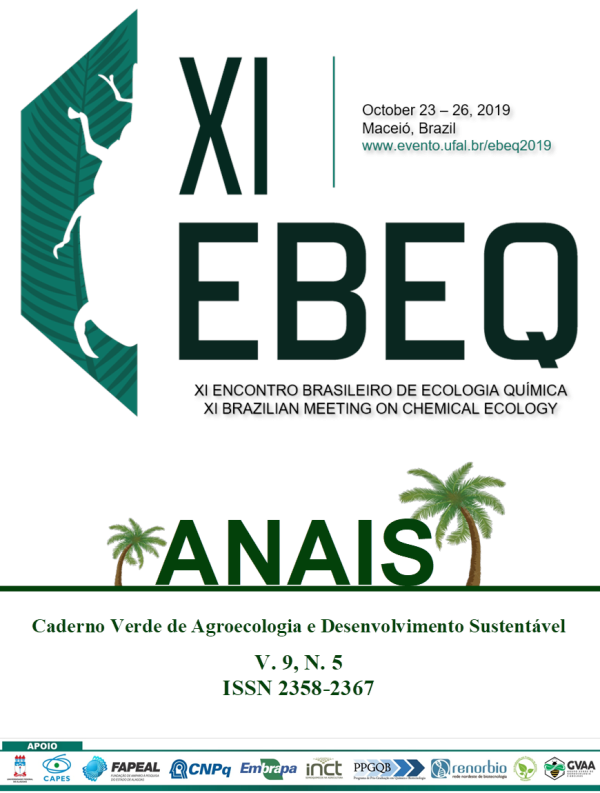INFLUENCE OF HERBIVORY-INDUCED COMPOUNDS ON CORN PLANT DIRECT DEFENSE
Keywords:
BENZOXAZINOIDES, DIRECT PLANT DEFENSE, Dichelops melacanthus, Zea maysAbstract
Benzoxazinoids are common secondary metabolites in plants of the Poaceae family that act in plant defense. To evaluate the effect of herbivory induced plant volatiles (HIPVs) on the direct defense of maize production of benzoxazinoids in plants with and without herbivory of the stink bug Dichelops melacanthus was evaluated. The compounds: indole, (E)-2-hexenyl acetate, (Z)-3-hexenyl acetate, (R,S)-linalol, DMNT and (E)-β-farnesene were selected for this study. Healthy maize plants were exposed or not to individual compounds for 24 h. After this period, the exposition was interrupted, and plants were allowed to rest for one hour. After that each plant received or not virgin 5 D. melacanthus females and after 96h of herbivory the plants were submitted to a liquid-liquid extraction. The extracts obtained were analyzed by HPLC with UV detector and LC-MS. To evaluate whether plants subjected to volatiles had their direct defense activated, plants exposed or not to VPIHs were offered as food for D. melacanthus (males and females). The following parameters were measured: fertility, fecundity and survival of D. melacanthus. The indole and (Z)-3-hexenyl acetate induced the production of benzoxazinoids DIMBOA and HMBOAGlc, respectively. Plants that received the compounds (E)-2-hexenyl acetate, (E)-β-farnesene and DMNT showed suppression in the production of some benzoxazinoids, such as HMBOAGlc, DIMBOAGlc, DIMBOA and HDMBOAGlc, when compared to plants submitted only to herbivory. Insects fed on plants treated with such compounds, as well as indole, linalool and (Z)-3-hexenyl acetate, had reduced longevity, fecundity and fertility compared to insects fed on untreated maize plants. Induced plant defense covers a wide variety of mechanisms, in which case there has probably been some molecular change that has diminished insect feeding in plants treated with HIPVs. Further studies are been conducted to elucidate this hypothesis.Downloads
Published
How to Cite
Issue
Section
License
Termo de cessão de direitos autorias
Esta é uma revista de acesso livre, em que, utiliza o termo de cessão seguindo a lei nº 9.610/1998, que altera, atualiza e consolida a legislação sobre direitos autorais no Brasil.
O(s) autor(es) doravante designado(s) CEDENTE, por meio desta, publica a OBRA no Caderno Verde de Agroecologia e Desenvolvimento Sustentável, representada pelo Grupo Verde de Agroecologia e Abelhas (GVAA), estabelecida na Rua Vicente Alves da Silva, 101, Bairro Petrópolis, Cidade de Pombal, Paraíba, Brasil. Caixa Postal 54 CEP 58840-000 doravante designada CESSIONÁRIA, nas condições descritas a seguir:
O CEDENTE declara que é (são) autor(es) e titular(es) da propriedade dos direitos autorais da OBRA submetida.
O CEDENTE declara que a OBRA não infringe direitos autorais e/ou outros direitos de propriedade de terceiros, que a divulgação de imagens (caso as mesmas existam) foi autorizada e que assume integral responsabilidade moral e/ou patrimonial, pelo seu conteúdo, perante terceiros.
O CEDENTE mantêm os direitos autorais e concedem à revista o direito de divulgação da OBRA, com o trabalho simultaneamente licenciado sob a Licença Creative Commons do tipo atribuição CC-BY.
O CEDENTE têm autorização para distribuição não-exclusiva da versão do trabalho publicada nesta revista.
O CEDENTE têm permissão e são estimulados a publicar e distribuir seu trabalho online (ex.: em repositórios institucionais ou na sua página pessoal) a qualquer ponto antes ou durante o processo editorial, já que isso pode gerar alterações produtivas, bem como aumentar o impacto e a citação do trabalho publicado.








